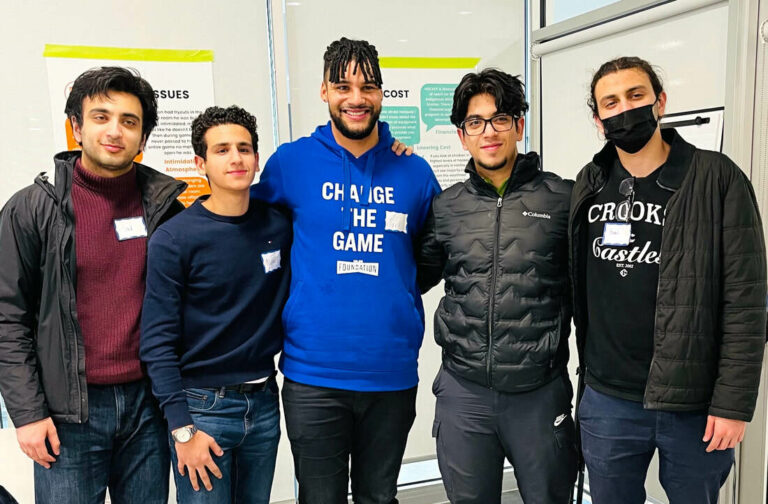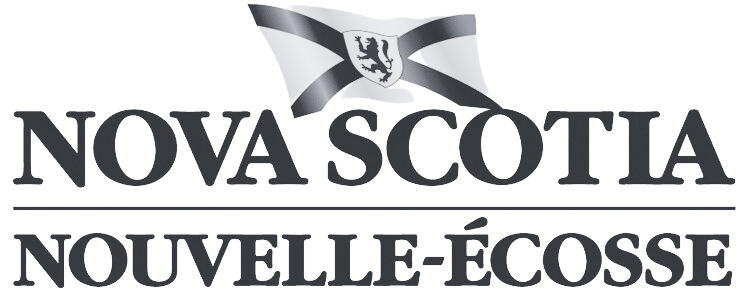Written by Denise Withers
The silence stung, former NHL defenceman Mark Fraser admits.
He'd just retired from a 14-year career as a professional hockey player when the Black Lives Matter movement swept the world after George Floyd's murder in 2020. Like many other athletes, Mark watched closely as pro sports leagues responded to the racial crisis, led by the NBA and NFL.
But from his own community, his NHL family, there was only silence.
"I found myself at this really weird intersection, being a newly-retired black hockey player, an NHLer and seeing that when something happened that really impacted me as a black man, my community that I was connected to and in many ways gave my life to for 30 years didn't show up for me. Or show that it understood my lived experience. And that inability to react in an appropriate manner to what was happening was heartbreaking for me."
Seeing an opportunity to inspire change, Mark reached out to Kyle Dubas, General Manager of the Toronto Maple Leafs (MLSE), to talk about what could be done. After many months and conversations, Mark joined the team in a newly created role for Equity, Diversity and Inclusion. He hoped it would give him a real chance to change hockey culture, for good.
"So I'm trying to improve our culture from the lens of a racialized and marginalized person who in many ways was included and had great experiences in the game – but not without dealing with constant pain, whether it be microaggressions or just systemic, small little paper cuts over and over that eventually built up to something much larger."
Connecting change at the NHL and FHL
A few months later, he discovered the FHL and saw the perfect opportunity to extend the impact of his work, by sharing his expertise across the broader hockey community.
"What they're trying to do at a grassroots level of innovation is very similar to what I'm trying to do at the pro level. And everything is kind of net new. We're in this space of trying to create things that can land, that can be easily digested within this ecosystem. But at the same time, it's all about breaking down barriers and changing lives and accelerating development. So anything I could do to lend my experience or knowledge, I was willing to help."
Over the next six months, Mark worked as a coach and facilitator with the seven project teams at the Lab who were tackling issues from ice allocation to visibility.
"I've really been able to lean on some of my expertise, especially in the early ideation stages, to help groups figure out what they want to address, what their angle is. Since I've been working with the Leafs for over a year now, I have a good understanding of what will land and what may not. Plus, I can draw on my experience during my career as a player."

Lived experience is priceless in this work
But making change through social innovation can be tough work, as the teams soon discovered. Unexpected obstacles and setbacks can discourage even the most passionate change-makers. That's where Mark's been able to tap into his NHL experience, sharing his leadership, resilience and work ethic to help them keep showing up and trust the process.
"I just try to empower others and keep them uplifted and positive and driven and disciplined to whatever the task is at hand. And remind them that when things don't work out, it isn't necessarily a failure. It's just a continued navigation through the journey of what's actually going to help create change."
Thanks to his unique insight and expertise, Mark quickly became a go-to trusted advisor for Lab teams.
- When a racially-charged incident exploded across the local media and hockey world, Lab participant Craig Robinson of the Halifax Hawks reached out to ask what kind of response Mark would have wanted from his own hockey association if that had happened to him when he was a player.
- As Matt English and Leonard Roberts struggled to refine their website project , Mark's stories introduced them to the idea of synthetic ice and inspired them to pivot.
- His understanding of how to work with organizations has been critical to helping Andrew Paris and his team explore options for educating Boards of minor hockey associations.
- The young guys building the website to help Muslim families get started in hockey spent hours mining his childhood experience for practical tips.
- And he was able to provide strategic support for Christina Lamey and Leijsa Wilton as they sought to change government policies about ice allocation.
"It is challenging at times because, in the space of social innovation, it's a lot about convincing others to see things in a more inclusive way. To break down biases that are just there because people have walked their path for so long, and try to open up new perspectives."
Building empathy and trust is key to behaviour change
Mark knows from experience that there's no secret sauce for social innovation. But one thing that has been working well for MLSE is the creation of safe spaces for people to share stories and engage in meaningful dialogue.
"In hockey, especially in the locker room, we refer to ourselves as a family a lot. And what I've been able to do with players, front office staff, coaches and trainers, is to show the different disparities that exist even within this family. And paint a picture of, 'Wouldn't you want to know that a family member was hurting and likely hurting silently or struggling silently?' And help them see that the fact that it is silent is because – unintentional to any of us in the room – we've created a culture of silence.
By empowering everyone to share their stories, Mark and his team are not only raising awareness and understanding of people’s lived experiences, but they're also building empathy – a key competitive advantage for any organization.
"When you become more empathetic, you actually become more mature as an athlete. And you will dig a little bit deeper for that fellow brother or sister beside you now. You know something about them that you didn't know before, care for them on a deeper level than you might have before. It's scientifically proven that empathy helps us on the ice as a team to perform more for one another. But beyond that, just as an organization, having empathy for one another is the foundation that allows us to be able to grow."
Sharing stories is a powerful first step
As he looks for ways to build on what he's learning at MLSE, Mark sees that this kind of story-driven intervention could also work well at the FHL, as an option to formal DEI training.
"Maybe we go right to the boards of minor hockey associations and storytell around some of the lived experience of the actual people who are playing the game and some of the hardships that they've had to experience, as an education from the sources themselves. What better testimony than to hear that from those you're actually serving?"
Strategically, he's also able to bring a fresh set of eyes to the Lab, to help its leadership figure out how best to support project teams and where to go from here.
"Looking ahead for the Future of Hockey Lab, it would be interesting to take some of the successes from this year and be able to almost 'bucket' them, to identify – here's a lane, whether it's ice allocation or accessibility to ice, where we found success. Here's a path or a bit of a blueprint that others could use if they want to join with us."
Plus, he hopes to help them discover what parts of the innovation process were toughest and where the Lab could provide more tangible, just-in-time support for project teams. As Mark notes, it's important to find ways to keep the momentum going, bearing in mind that most of the innovators also have full-time jobs, along with family and community commitments.
Mark knows that changing the narrative to break the silence around discrimination and injustice in hockey won’t be easy. But recent successes give him – and the Lab – hope for the future.
"Even hearing some of our internal stories and dialogue, there've been racial incidents over the last year that have happened in the pro hockey community that I didn't even think to address. Because if I did, I'd be addressing them every two weeks. But because of the dialogue and learning we've done internally, when these things happened, our coaches and GMs reached out to me asking, 'What can we do to support our black players in this moment?' And I've had these really proud moments where I'm thinking, 'Wow, you guys got there on your own? That's amazing.' So there's been a lot of success that's come from that."



